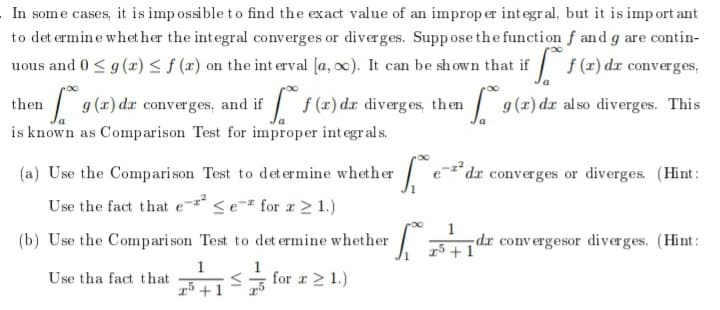In some cases, it is imp ossible to find the exact value of an improp er int egral, but it is imp ort ant to det ermin e whet her the integral converges or diverges. Supp ose the function f and g are contin- uous and 0< g (x)< S(x) on the int erval (a, oc). It can be shown that if f (x) dx converges, 9 (2) dr converges, and if / f (2) dr diverges, then 9(2) d.r also diverges. This then is known as Comparison Test for improper integrals. (a) Use the Comparison Test to det er mine whether e=**dx converges or diverges. (Hint: Use the fact that e
In some cases, it is imp ossible to find the exact value of an improp er int egral, but it is imp ort ant to det ermin e whet her the integral converges or diverges. Supp ose the function f and g are contin- uous and 0< g (x)< S(x) on the int erval (a, oc). It can be shown that if f (x) dx converges, 9 (2) dr converges, and if / f (2) dr diverges, then 9(2) d.r also diverges. This then is known as Comparison Test for improper integrals. (a) Use the Comparison Test to det er mine whether e=**dx converges or diverges. (Hint: Use the fact that e
Calculus: Early Transcendentals
8th Edition
ISBN:9781285741550
Author:James Stewart
Publisher:James Stewart
Chapter1: Functions And Models
Section: Chapter Questions
Problem 1RCC: (a) What is a function? What are its domain and range? (b) What is the graph of a function? (c) How...
Related questions
Question

Transcribed Image Text:In some cases, it is imp ossible to find the exact value of an improp er integral, but it is imp ort ant
to det ermin e whet her the integral converges or diverges. Supp ose the function f and g are contin-
uous and 0< g (r) < f (x) on the int erval [a, oc). It can be shown that if / f(x) dx converges,
then / 9 (a) da converges, and if f (x) dæ diverges, then
| 9(x) dæ also diverges. This
is known as Comparison Test for improper integrals.
(a) Use the Comparison Test to det er mine whether
e*dx converges or diverges. (Hint:
Use the fact that e- <e¯" for r > 1.)
(b) Use the Compari son Test to det ermine whether
L dr convergesor diverges. (Hint:
15 +1
1
Use tha fact that
for r 2 1.)
Expert Solution
This question has been solved!
Explore an expertly crafted, step-by-step solution for a thorough understanding of key concepts.
Step by step
Solved in 5 steps with 4 images

Recommended textbooks for you

Calculus: Early Transcendentals
Calculus
ISBN:
9781285741550
Author:
James Stewart
Publisher:
Cengage Learning

Thomas' Calculus (14th Edition)
Calculus
ISBN:
9780134438986
Author:
Joel R. Hass, Christopher E. Heil, Maurice D. Weir
Publisher:
PEARSON

Calculus: Early Transcendentals (3rd Edition)
Calculus
ISBN:
9780134763644
Author:
William L. Briggs, Lyle Cochran, Bernard Gillett, Eric Schulz
Publisher:
PEARSON

Calculus: Early Transcendentals
Calculus
ISBN:
9781285741550
Author:
James Stewart
Publisher:
Cengage Learning

Thomas' Calculus (14th Edition)
Calculus
ISBN:
9780134438986
Author:
Joel R. Hass, Christopher E. Heil, Maurice D. Weir
Publisher:
PEARSON

Calculus: Early Transcendentals (3rd Edition)
Calculus
ISBN:
9780134763644
Author:
William L. Briggs, Lyle Cochran, Bernard Gillett, Eric Schulz
Publisher:
PEARSON

Calculus: Early Transcendentals
Calculus
ISBN:
9781319050740
Author:
Jon Rogawski, Colin Adams, Robert Franzosa
Publisher:
W. H. Freeman


Calculus: Early Transcendental Functions
Calculus
ISBN:
9781337552516
Author:
Ron Larson, Bruce H. Edwards
Publisher:
Cengage Learning